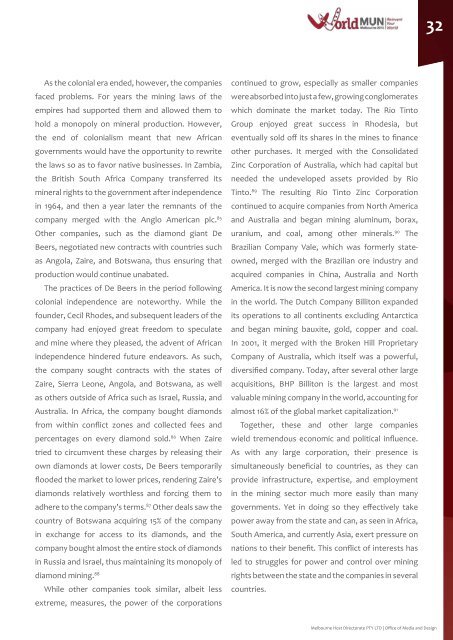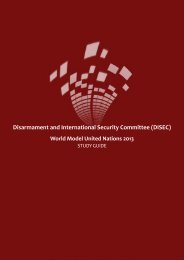SPECPOL - World Model United Nations
SPECPOL - World Model United Nations
SPECPOL - World Model United Nations
Create successful ePaper yourself
Turn your PDF publications into a flip-book with our unique Google optimized e-Paper software.
As the colonial era ended, however, the companies<br />
faced problems. For years the mining laws of the<br />
empires had supported them and allowed them to<br />
hold a monopoly on mineral production. However,<br />
the end of colonialism meant that new African<br />
governments would have the opportunity to rewrite<br />
the laws so as to favor native businesses. In Zambia,<br />
the British South Africa Company transferred its<br />
mineral rights to the government after independence<br />
in 1964, and then a year later the remnants of the<br />
company merged with the Anglo American plc. 85<br />
Other companies, such as the diamond giant de<br />
Beers, negotiated new contracts with countries such<br />
as Angola, Zaire, and Botswana, thus ensuring that<br />
production would continue unabated.<br />
the practices of de Beers in the period following<br />
colonial independence are noteworthy. While the<br />
founder, Cecil Rhodes, and subsequent leaders of the<br />
company had enjoyed great freedom to speculate<br />
and mine where they pleased, the advent of African<br />
independence hindered future endeavors. As such,<br />
the company sought contracts with the states of<br />
Zaire, Sierra Leone, Angola, and Botswana, as well<br />
as others outside of Africa such as israel, Russia, and<br />
Australia. In Africa, the company bought diamonds<br />
from within conflict zones and collected fees and<br />
percentages on every diamond sold. 86 When Zaire<br />
tried to circumvent these charges by releasing their<br />
own diamonds at lower costs, de Beers temporarily<br />
flooded the market to lower prices, rendering Zaire’s<br />
diamonds relatively worthless and forcing them to<br />
adhere to the company’s terms. 87 Other deals saw the<br />
country of Botswana acquiring 15% of the company<br />
in exchange for access to its diamonds, and the<br />
company bought almost the entire stock of diamonds<br />
in Russia and israel, thus maintaining its monopoly of<br />
diamond mining. 88<br />
While other companies took similar, albeit less<br />
extreme, measures, the power of the corporations<br />
continued to grow, especially as smaller companies<br />
were absorbed into just a few, growing conglomerates<br />
which dominate the market today. The Rio Tinto<br />
Group enjoyed great success in Rhodesia, but<br />
eventually sold off its shares in the mines to finance<br />
other purchases. it merged with the Consolidated<br />
Zinc Corporation of Australia, which had capital but<br />
needed the undeveloped assets provided by Rio<br />
tinto. 89 the resulting Rio tinto Zinc Corporation<br />
continued to acquire companies from North America<br />
and Australia and began mining aluminum, borax,<br />
uranium, and coal, among other minerals. 90 the<br />
Brazilian Company Vale, which was formerly stateowned,<br />
merged with the Brazilian ore industry and<br />
acquired companies in China, Australia and North<br />
America. it is now the second largest mining company<br />
in the world. the dutch Company Billiton expanded<br />
its operations to all continents excluding Antarctica<br />
and began mining bauxite, gold, copper and coal.<br />
In 2001, it merged with the Broken Hill Proprietary<br />
Company of Australia, which itself was a powerful,<br />
diversified company. Today, after several other large<br />
acquisitions, BHP Billiton is the largest and most<br />
valuable mining company in the world, accounting for<br />
almost 16% of the global market capitalization. 91<br />
together, these and other large companies<br />
wield tremendous economic and political influence.<br />
As with any large corporation, their presence is<br />
simultaneously beneficial to countries, as they can<br />
provide infrastructure, expertise, and employment<br />
in the mining sector much more easily than many<br />
governments. Yet in doing so they effectively take<br />
power away from the state and can, as seen in Africa,<br />
South America, and currently Asia, exert pressure on<br />
nations to their benefit. This conflict of interests has<br />
led to struggles for power and control over mining<br />
rights between the state and the companies in several<br />
countries.<br />
32<br />
Melbourne Host Directorate PTY LTD | Office of Media and Design

















